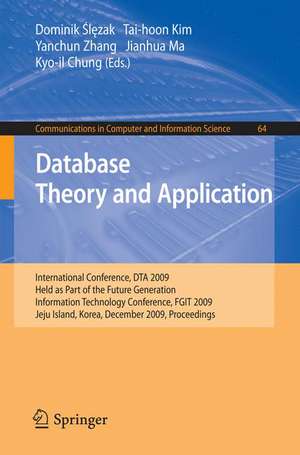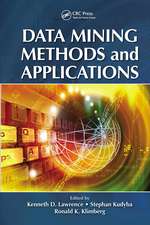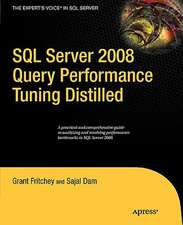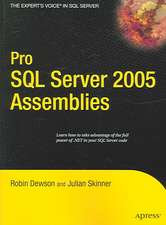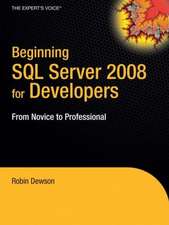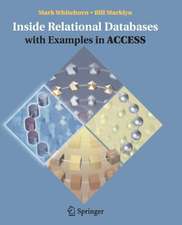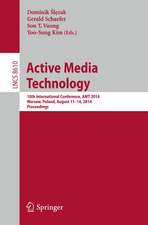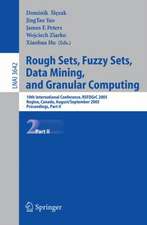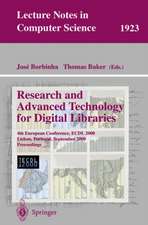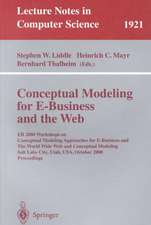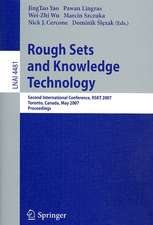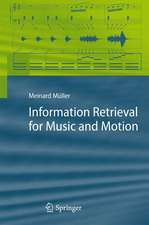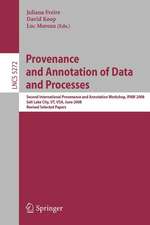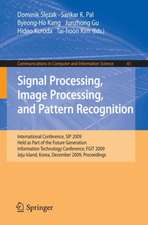Database Theory and Application: International Conference, DTA 2009, Held as Part of the Future Generation Information Technology Conference, FGIT 2009, Jeju Island, Korea, December 10-12, 2009, Proceedings: Communications in Computer and Information Science, cartea 64
Editat de Dominik Slezak, Yanchun Zhangen Limba Engleză Paperback – 24 noi 2009
Din seria Communications in Computer and Information Science
- 20%
 Preț: 325.48 lei
Preț: 325.48 lei - 20%
 Preț: 669.06 lei
Preț: 669.06 lei - 20%
 Preț: 324.64 lei
Preț: 324.64 lei - 20%
 Preț: 337.85 lei
Preț: 337.85 lei - 20%
 Preț: 656.19 lei
Preț: 656.19 lei - 20%
 Preț: 659.97 lei
Preț: 659.97 lei - 20%
 Preț: 333.88 lei
Preț: 333.88 lei - 20%
 Preț: 337.52 lei
Preț: 337.52 lei - 20%
 Preț: 656.36 lei
Preț: 656.36 lei - 20%
 Preț: 656.69 lei
Preț: 656.69 lei - 20%
 Preț: 659.31 lei
Preț: 659.31 lei -
 Preț: 392.60 lei
Preț: 392.60 lei - 20%
 Preț: 329.58 lei
Preț: 329.58 lei -
 Preț: 386.00 lei
Preț: 386.00 lei - 20%
 Preț: 336.02 lei
Preț: 336.02 lei - 20%
 Preț: 334.53 lei
Preț: 334.53 lei - 20%
 Preț: 331.74 lei
Preț: 331.74 lei - 20%
 Preț: 655.85 lei
Preț: 655.85 lei - 20%
 Preț: 338.49 lei
Preț: 338.49 lei - 20%
 Preț: 333.88 lei
Preț: 333.88 lei - 20%
 Preț: 334.53 lei
Preț: 334.53 lei - 20%
 Preț: 338.68 lei
Preț: 338.68 lei - 20%
 Preț: 666.58 lei
Preț: 666.58 lei - 20%
 Preț: 307.20 lei
Preț: 307.20 lei - 20%
 Preț: 336.02 lei
Preț: 336.02 lei - 20%
 Preț: 338.68 lei
Preț: 338.68 lei - 20%
 Preț: 330.24 lei
Preț: 330.24 lei - 20%
 Preț: 660.81 lei
Preț: 660.81 lei - 15%
 Preț: 648.42 lei
Preț: 648.42 lei - 20%
 Preț: 653.56 lei
Preț: 653.56 lei - 20%
 Preț: 332.06 lei
Preț: 332.06 lei - 20%
 Preț: 337.85 lei
Preț: 337.85 lei - 20%
 Preț: 1055.29 lei
Preț: 1055.29 lei - 20%
 Preț: 836.50 lei
Preț: 836.50 lei - 20%
 Preț: 656.69 lei
Preț: 656.69 lei - 20%
 Preț: 1231.01 lei
Preț: 1231.01 lei - 20%
 Preț: 331.25 lei
Preț: 331.25 lei - 20%
 Preț: 336.02 lei
Preț: 336.02 lei - 20%
 Preț: 323.00 lei
Preț: 323.00 lei - 20%
 Preț: 113.94 lei
Preț: 113.94 lei - 20%
 Preț: 336.21 lei
Preț: 336.21 lei -
 Preț: 387.75 lei
Preț: 387.75 lei - 20%
 Preț: 470.58 lei
Preț: 470.58 lei - 20%
 Preț: 750.86 lei
Preț: 750.86 lei - 20%
 Preț: 337.00 lei
Preț: 337.00 lei - 20%
 Preț: 327.95 lei
Preț: 327.95 lei - 20%
 Preț: 410.03 lei
Preț: 410.03 lei - 20%
 Preț: 335.36 lei
Preț: 335.36 lei - 20%
 Preț: 534.59 lei
Preț: 534.59 lei - 20%
 Preț: 673.02 lei
Preț: 673.02 lei
Preț: 328.79 lei
Preț vechi: 410.98 lei
-20% Nou
Puncte Express: 493
Preț estimativ în valută:
62.91€ • 65.69$ • 52.07£
62.91€ • 65.69$ • 52.07£
Carte tipărită la comandă
Livrare economică 05-19 aprilie
Preluare comenzi: 021 569.72.76
Specificații
ISBN-13: 9783642105821
ISBN-10: 3642105823
Pagini: 197
Ilustrații: XII, 185 p.
Dimensiuni: 155 x 235 x 13 mm
Greutate: 0.32 kg
Ediția:2009
Editura: Springer Berlin, Heidelberg
Colecția Springer
Seria Communications in Computer and Information Science
Locul publicării:Berlin, Heidelberg, Germany
ISBN-10: 3642105823
Pagini: 197
Ilustrații: XII, 185 p.
Dimensiuni: 155 x 235 x 13 mm
Greutate: 0.32 kg
Ediția:2009
Editura: Springer Berlin, Heidelberg
Colecția Springer
Seria Communications in Computer and Information Science
Locul publicării:Berlin, Heidelberg, Germany
Public țintă
ResearchCuprins
Steganalysis for Reversible Data Hiding.- An Incremental View Maintenance Approach Using Version Store in Warehousing Environment.- The Study of Synchronization Framework among Multi-datasets.- Clustering News Articles in NewsPage.com Using NTSO.- Categorizing News Articles Using NTC without Decomposition.- A Comparative Analysis of XML Schema Languages.- Mining Approximate Frequent Itemsets over Data Streams Using Window Sliding Techniques.- Preserving Referential Integrity Constraints in XML Data Transformation.- Know-Ont: Engineering a Knowledge Ontology for an Enterprise.- Transformation of Data with Constraints for Integration: An Information System Approach.- Comparative Analysis of XLMiner and Weka for Association Rule Mining and Clustering.- Infobright for Analyzing Social Sciences Data.- Enhanced Statistics for Element-Centered XML Summaries.- Algorithm for Enumerating All Maximal Frequent Tree Patterns among Words in Tree-Structured Documents and Its Application.- A Method for Learning Bayesian Networks by Using Immune Binary Particle Swarm Optimization.- A Semantics-Preserving Approach for Extracting OWL Ontologies from UML Class Diagrams.- Data Warehousing and Business Intelligence: Benchmark Project for the Platform Selection.- Automatic Extraction of Decision Rules from Non-deterministic Data Systems: Theoretical Foundations and SQL-Based Implementation.- Soft Set Approach for Maximal Association Rules Mining.- Soft Set Theoretic Approach for Dimensionality Reduction.- Rough Set Approach for Categorical Data Clustering.
